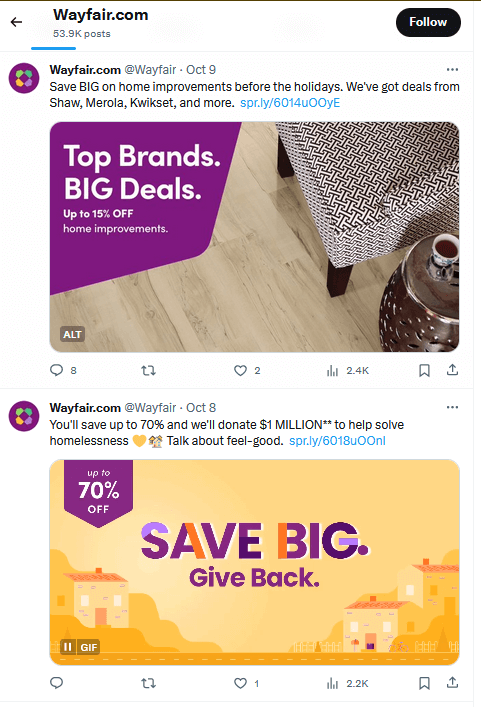Niche Marketing: Cracking the Code for Small Businesses
There are two types of marketers- one who targets all men and women young and old and another who targets eco-conscious outdoor enthusiasts. Who do you think is likely to succeed? The latter, no doubt. Why? Because they know their audience’s preferences and lifestyles. That’s the heart of niche marketing.
Niche marketing is about precision, not broad strokes. It is about narrowing the focus and honing in on specific audience segments. Doesn’t that sound like the most cost-effective approach for a small business?

Instead of trying to reach everyone, you identify specific niche segments in your audience and tailor your campaigns to them. This is a great way for small businesses to compete in a crowded market.
Furthermore, with niche marketing, you foster strong customer relationships. And these loyal customers become strong brand ambassadors, providing the anchor your brand needs to thrive in the market. It’s an ideal place to start and build upon.
Are you eager to dive into niche marketing? Then this blog is for you. Today we’ll be giving a brief overview of niche marketing and some strategies to help you take the plunge.
Niche Marketing – a Rundown of the Benefits for Small Businesses
Niche marketing is the type of marketing approach wherein you narrow down to a specific segment of your target audience. This could be based on their preferences, values or lifestyle choices.
In other words, this is about the precise alignment of a company’s offerings with the unique needs and passions of a distinct segment. Let’s now look at some quick facts that prove the benefits of the niche marketing strategy for small businesses.
- Data shows that there are over 33.2 million small businesses in the US. Amidst this competition, niche marketing can be the secret ingredient that helps your small business stand out.
- According to Forbes, running out of capital is one of the most common reasons behind several small businesses that fail within a short time. Niche marketing’s resource-efficient approach helps small businesses allocate their funds wisely, increasing their odds of success while avoiding financial pitfalls.
- About 88% of customers prioritize the experience a company provides as much as the services and products from it. Niche marketing allows small businesses to craft tailored experiences that precisely match their niche audience’s desires, resonating deeply with them.
- In fact, the personalized services a small business delivers are one of the reasons why about 45% of customers shop from SMEs. this personalization can be tedious and expensive with mass marketing whereas niche marketing simplifies it.
- Nearly 85% of marketers believe that word-of-mouth marketing helps increase brand awareness and build trust. Niche marketing helps target niche customers by aligning your brand values with theirs and these shared values turn them into loyal customers and brand advocates. These brand advocates help spread the word.
Now that we’ve covered the essentials, let’s dive into strategies to harness niche marketing for your small business.
8 Effective Niche Marketing Strategies For Small Businesses
1. Craft tailor-made content for your niche audience
To truly master niche marketing, your small business should create content that speaks directly to the heart of your niche audience. Everything about your branding materials and marketing materials, from the copy to the design elements, should be tailor-made for your niche audience.
To achieve this, start with designs that resonate with and accurately represent your niche audience. Know the kind of colors they would like, and the themes that have the best impact on them. Narrow down and highlight the most important details that appeal to these niche audiences.
Take the below web banner design for example. The focus here is not just any dog food but sous vide meals. The banner therefore highlights some of the things that people look for when choosing sous vide meals like quality ingredients, variety, etc.

To further strengthen this approach, ensure that the content tailored to your audience’s liking also tells a relatable story that resonates with them. For example, sustainability is one of the reasons why some people switch to plant-based meat. To address the ideals of this niche audience segment, the below video from Beyond Meat highlights the ecological impact of consuming plant-based meat over animal meat.
2. Collaborate with niche influencers
Humans crave human connections and that’s why they connect better with online content creators than with brands. To bridge this gap, brands collaborate with influencers. If niche marketing is your focus, then choose niche influencers for your collaboration rather than working with random celebrity influencers and social media stars who dabble in a bit of everything. Consider micro-influencers with a small loyal audience base.
For example, Untouched World is a fashion company recognized by the United Nations for sustainability. The brand collaborates with influencers who advocate sustainable fashion, Danni Duncan who predominantly talks about sustainable & secondhand fashion.
This strategy works because relationships between niche influencers and their followers are built on the basis of shared values. And therefore, these followers trust their favorite content creator’s recommendations especially when they involve brands that share their values.
KIMP Tip: When collaborating with niche influencers, leverage their visual storytelling abilities. Ask them to create content that authentically features your product or service within their niche context without deviating from their regular content and without sounding too promotional. This allows your brand to seamlessly fit into the influencer’s narrative and earn their followers’ trust.
3. Working with local charities and causes
Collaborating with local charities and causes can be a powerful strategy for small businesses to establish a meaningful presence within a niche market. It also demonstrates your commitment to shared values. This alignment can resonate strongly with your niche audience, creating a deeper connection and fostering brand loyalty.
Moreover, these efforts also enhance your business’s reputation and credibility within your niche. Because customers are more likely to trust and support a business that actively contributes to a cause they care about.
For example, Bombas is a comfort-focused sock brand that actively donates to homeless shelters. To strengthen its customer relationships and to build a strong community, the brand collaborates with local NGOs focusing on making the lives of the homeless better. The below post highlights one such collaboration of Bombas with a leading homeless charity in the UK, St Mungo’s.
Thank you to @BOMBAS for donating an incredible 19,000 socks to our services.
— St Mungo's (@StMungos) December 20, 2021
A clean pair of socks can make a huge difference to those arriving at an emergency shelter for the first time.
If you or your organisation could donate items too visit👉 https://t.co/6tvkkmsfoS pic.twitter.com/d452A5A9ZD
4. Engaging with niche communities
Niche communities consist of individuals who share specific interests, values, and passions. By engaging with these communities, you can craft marketing campaigns and products that resonate on a deeper level. This targeted relevance increases the likelihood of capturing the attention and loyalty of niche audiences. That’s why engaging with niche communities is an effective strategy for niche marketing.
In addition to this, you also have the benefit of gaining valuable insights into your niche audience through these communities. Because then you gain access to candid conversations about customer pain points, and preferences. This helps you tailor your campaigns to address these pain points and show how your business fits your customers’ needs.
Take the Lululemon brand for example. The brand focuses on inspiring its audience to stay active. To keep up with this and to connect with its niche audience, the brand hosts fitness tours and events. These help the brand build local communities of fitness enthusiasts.
5. Nurture word-of-mouth marketing
Word-of-mouth marketing and influencer recommendations sound somewhat similar at first glance; however, it is the authenticity of the former that sets it apart.
Word-of-mouth marketing relies on the genuine opinions and experiences of everyday consumers who share their thoughts and recommendations with friends, family, and acquaintances. These recommendations are often free from any financial incentives, making them perceived as more trustworthy and credible.
Moreover, word-of-mouth marketing often involves people recommending the products/services to like-minded folks, their friends, and family. Therefore, there is a high likelihood that the message reaches the intended niche audience. This is what makes nurturing word-of-mouth an excellent strategy for niche marketing.
The best way to do this is to focus on the experience you deliver and this naturally leads to enthusiastic recommendations. In addition to this, find creative ways to encourage your satisfied customers to share their experiences through photos, reviews, and testimonials.
Finally, create referral programs that reward customers for bringing in new business. This not only encourages existing customers to spread the word but also expands your niche community.
For example, Dropbox has one of the most popular referral programs. Did you know that this referral program led to about 3900% growth for Dropbox in a short span of 15 months?
Airbnb is yet another company that aces the art of nurturing word-of-mouth both from its hosts and guests. These referrals allow the brand to narrow down its approach and target specific niches like hosts and guests for example. The below email promotes a host referral program, which naturally, will be shared by the host with friends and families who are looking to let out their properties.
6. Identify the right platforms for your marketing
Sometimes even with all the above points sorted, your niche marketing plan does not go as intended – if you do not leverage the right platforms. Because, to see results, you don’t just need to know who the right people are but also where to reach them.
To understand this, conduct in-depth audience research to understand where your niche audience spends their time online. Discover the social media platforms, forums, and online communities they frequent and create content for those platforms rather than spending too much time trying to figure out every social media platform out there.
Moreover, this research also helps you wisely utilize your marketing budget by spending on paid advertising options in the respective platforms where your niche audience is present. This platform compartmentalization also helps you be present on the channel that aptly suits your brand personality. For example, Sephora predominantly relies on short videos and therefore the brand is pretty active on Instagram whereas you do not find many updates on its X page.
On the other hand, Wayfair, a renowned online home store, uses X for its discount and sale-related updates and Pinterest for sharing home styling ideas and more. This way, the brand connects with customers at an early stage in the sales funnel through Pinterest and existing customers looking for regular updates through X.
This shows Wayfair’s strategic platform selection as a way to ensure that they effectively address the diverse needs of their niche audience.
7. Learn from your competitors
Learning from your competitors’ strategies can be an effective way to try niche marketing. Because then you have the benefit of understanding the types of niche segments to categorize and the type of content to use to communicate with them. Starting with a tried and tested method makes things easier and more cost-effective for a small business.
From another perspective, determine your competitors may be falling short in niche marketing. Use this information to identify gaps and opportunities. Or if there is a niche segment relevant to your industry that your competitor does not seem to be focusing on, you have a big opportunity there.
When doing all this, remember to differentiate your brand. Find unique angles or approaches that set you apart within the niche market. Moreover, do not forget that niche marketing is dynamic. Therefore, staying vigilant and grabbing market trends in a timely manner boost the effectiveness of your marketing strategy.
KIMP Tip: Remember, while learning from competitors is valuable, it’s your unique brand identity that sets you apart. Start crafting your distinctive identity from day one, incorporating strong and brand-relevant designs consistently. A designated design team to work on all your designs can help achieve this.
Elevate Your Niche Marketing with Impactful Visuals By KIMP
In conclusion, in niche marketing, small businesses find opportunities to thrive by connecting with specialized audiences and catering to their unique desires. Furthermore, effective niche marketing hinges on more than just strategies; it thrives on impactful visuals that consistently represent your brand. Strong and brand-relevant designs create the foundation of your niche identity.
And as you can see from the examples we discussed, small businesses have an ongoing demand for these designs. So, a cost-effective way to tackle them is just what you need. Design subscriptions are such cost-effective solutions that help you get unlimited designs for a flat monthly fee. Want to see how that changes your small business’ creative workflow? Register now KIMP’s 7-day free trial!


